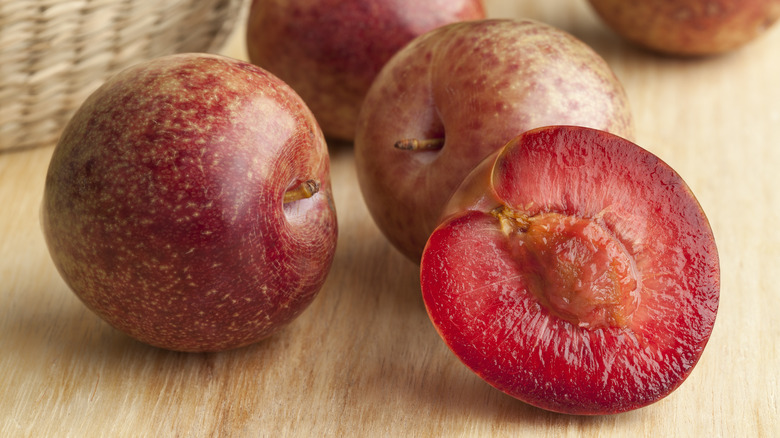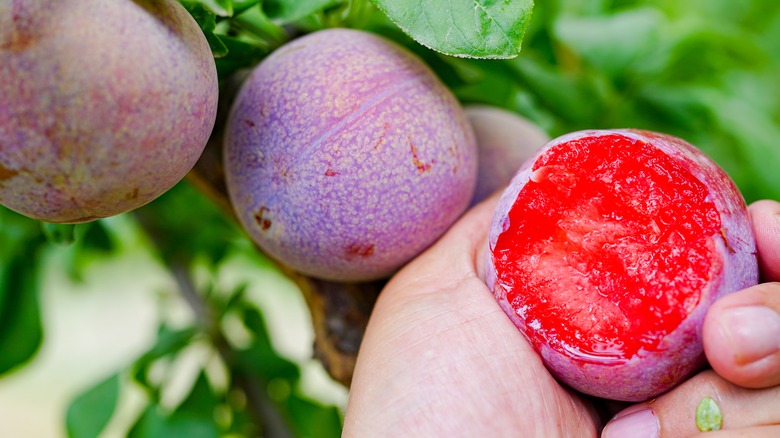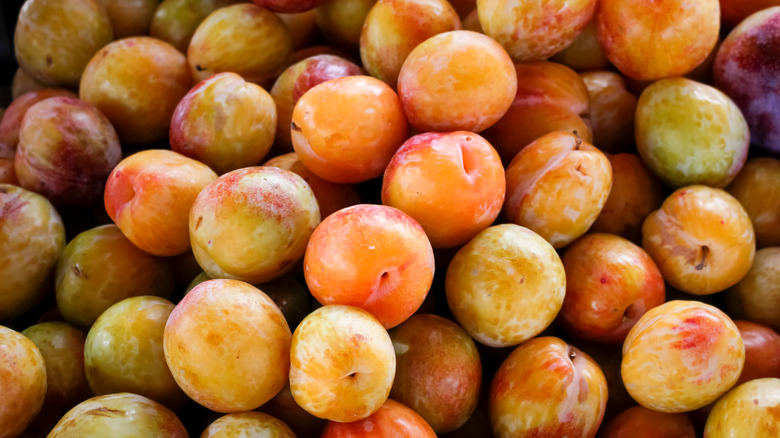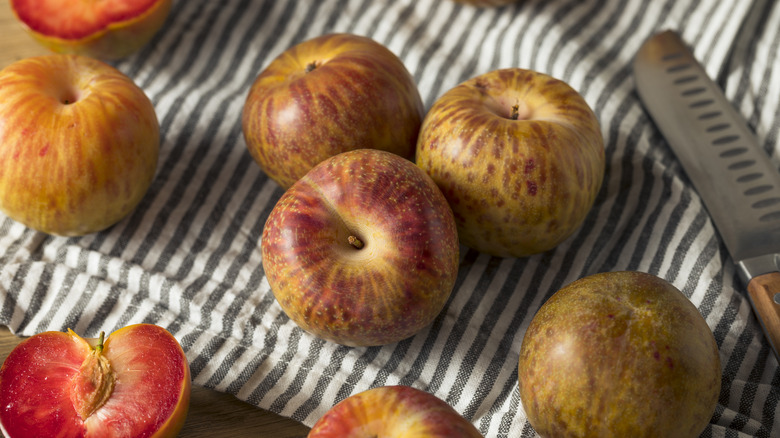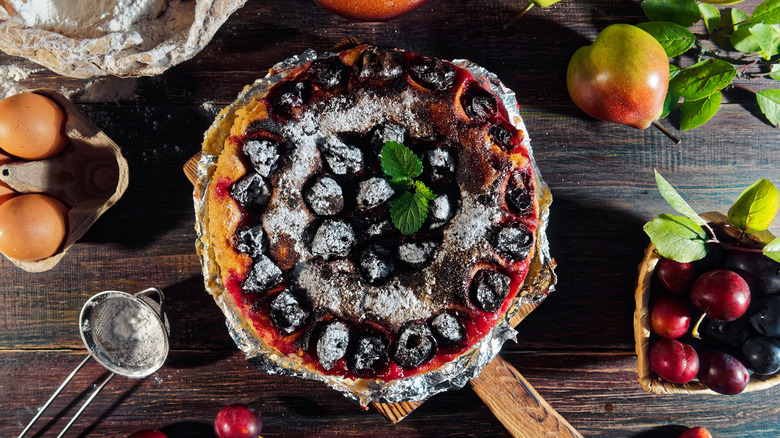Pluots Are A Hybrid Fruit That Emerged In The '80s
Pluots are a type of fruit that is a hybrid of plums and apricots. They were developed in the 1980s by Floyd Zaiger, a well-known fruit breeder in California. Pluots are known for their unique flavor and appearance, combining the sweetness of plums with the tartness of apricots. They typically have smooth skin and come in various colors, ranging from green to red to purple. The flesh of pluots is juicy and can appear yellow, pink, or red, depending on the variety.
Like plums and apricots, pluots have a high nutritional value. They are a good source of vitamins A and C, dietary fiber, and antioxidants. Pluots can be eaten fresh as a snack; used in various recipes such as salads, desserts, or jams; and can even be dried like other stone fruits.
It's worth noting that there are different varieties of pluots, each with its own distinct characteristics, flavor, texture, and ripening time. Some popular pluot varieties include Dapple Dandy, Flavor Grenade, Flavor King, and Splash.
What do pluots taste like
Pluots have a flavor that combines the sweetness of plums with the slight tartness of apricots. The exact taste can vary, as different varieties have different levels of sweetness and acidity. They often have a rich, sweet flavor with floral undertones. The taste can range from mild to very sweet, depending on the variety and the level of ripeness. Some pluots may have a slightly tangy or acidic edge. This tartness can add a pleasant contrast to the overall sweetness of the fruit.
Overall, pluots are prized for their complex and delicious flavor, which combines the best qualities of plums and apricots. They are often described as having a luscious, tropical, and intensely fruity taste. Some pluots have a creamy texture that adds a luxurious mouthfeel. This creaminess is especially noticeable in the rarer varieties. Some may be more plum-like, with deeper red or purple flesh, while others might be more apricot-like, with lighter-colored flesh.
Where to buy pluots
Pluots can typically be found in well-stocked grocery stores and specialty fruit markets. Farmers' markets and local fruit stands are also good places to find pluots, as these venues often offer a variety of fresh, locally grown produce.
Pluots are more widely available during their peak season, which is generally from late spring to early fall, depending on the region. When pluots are in season, they may be displayed alongside plums, apricots, or other stone fruits. Look for pluots that have vibrant colors, firm skin (but not overly hard), and a pleasant aroma.
Additionally, online grocery platforms and specialty fruit delivery services may offer pluots for purchase and deliver them directly to your doorstep. Check with your preferred online retailer or specialty fruit suppliers to see if they carry pluots. Remember that availability can vary depending on your location and the time of year, so it's best to check with local retailers or online sources to find the freshest and most readily available pluots in your area.
Health benefits
Pluots, particularly the darker-fleshed varieties, contain antioxidants like anthocyanins and flavonoids. These compounds help neutralize harmful free radicals in the body, reducing oxidative stress and inflammation, which can contribute to various chronic diseases. Pluots are a good source of dietary fiber, which aids digestion and promotes regularity. They are also high in vitamin C, an essential nutrient that supports and boosts the immune system by promoting the production of white blood cells and enhancing the body's ability to fight off infections and illnesses.
Relatively low in calories and fat, pluots are a healthier option compared to many processed snacks and desserts. Pluots also contain potassium, an essential mineral that helps regulate blood pressure, support proper muscle function, and maintain electrolyte balance. It's worth noting that the nutritional content of pluots may vary slightly depending on the specific variety and its ripeness. To maximize the health benefits, enjoy pluots when they are ripe and at their peak freshness. As with any fruit, moderation is key, and including pluots as part of a balanced diet can contribute to overall health and well-being.
How to use them
Pluots are versatile and can be used in various sweet and savory dishes. Add sliced or diced pluots to fruit salads for a burst of color, sweetness, and a unique flavor. They complement other fruits like berries, peaches, nectarines, and grapes. Pluots can be used in desserts such as pies, crisps, cobblers, tarts, and cakes. Create a delightful pluot pie or tart with a buttery crust and a sprinkle of sugar or cinnamon for enhanced flavor.
Make delicious jams, preserves, or fruit compotes using pluots. Combine chopped pluots with sugar and cook until the mixture thickens, and enjoy on toast, scones, or pancakes. Grilling pluots brings out their natural sweetness and adds a smoky flavor. Cut the pluots in half, remove the pit, and grill them over medium heat until they are slightly caramelized. Create flavorful chutneys with pluots that pair well with grilled meats, roasted vegetables, or cheese platters. Boost the sweetness and nutritional value of your smoothies by adding ripe pluots. Combine them with yogurt, milk, plant-based milk, and other fruits and vegetables for a refreshing drink.
Pluots are a true testament to nature's variety. A harmonious fusion of plums and apricots, these delightful fruits offer a symphony of flavors, enticing the sweet-toothed and the discerning palates alike.
